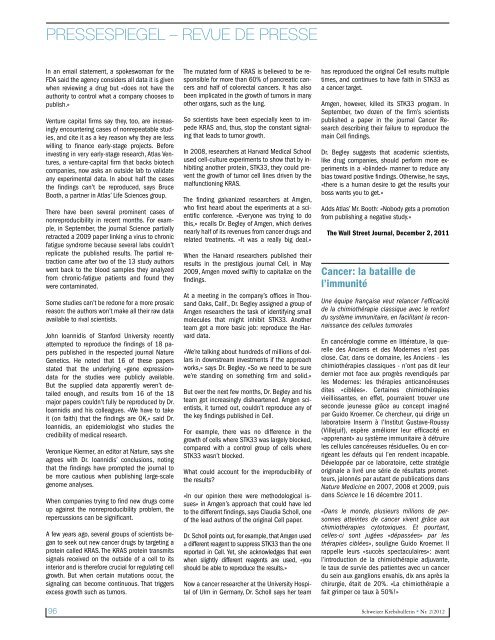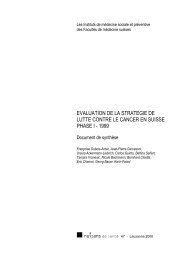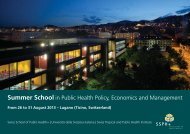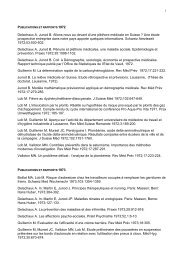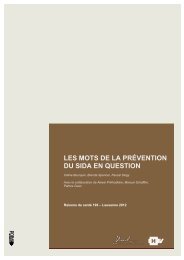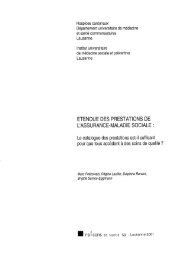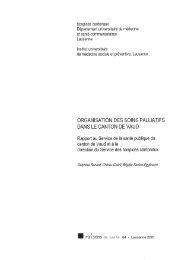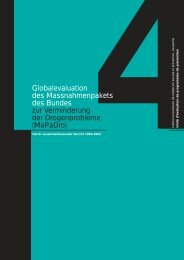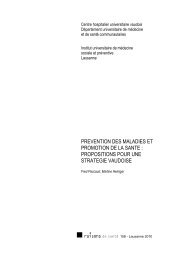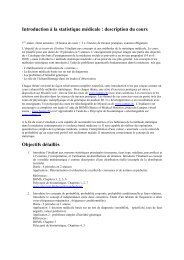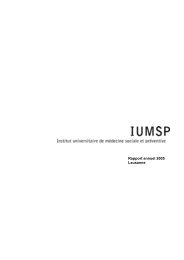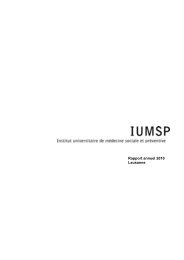Fortbildungen / Formations continues 2012 - IUMSP
Fortbildungen / Formations continues 2012 - IUMSP
Fortbildungen / Formations continues 2012 - IUMSP
Erfolgreiche ePaper selbst erstellen
Machen Sie aus Ihren PDF Publikationen ein blätterbares Flipbook mit unserer einzigartigen Google optimierten e-Paper Software.
PRESSESPIEGEL – REVUE DE PRESSE<br />
In an email statement, a spokeswoman for the<br />
FDA said the agency considers all data it is given<br />
when reviewing a drug but «does not have the<br />
authority to control what a company chooses to<br />
publish.»<br />
Venture capital �rms say they, too, are increasingly<br />
encountering cases of nonrepeatable studies,<br />
and cite it as a key reason why they are less<br />
willing to �nance early-stage projects. Before<br />
investing in very early-stage research, Atlas Ventures,<br />
a venture-capital �rm that backs biotech<br />
companies, now asks an outside lab to validate<br />
any experimental data. In about half the cases<br />
the �ndings can’t be reproduced, says Bruce<br />
Booth, a partner in Atlas’ Life Sciences group.<br />
There have been several prominent cases of<br />
nonreproducibility in recent months. For example,<br />
in September, the journal Science partially<br />
retracted a 2009 paper linking a virus to chronic<br />
fatigue syndrome because several labs couldn’t<br />
replicate the published results. The partial retraction<br />
came after two of the 13 study authors<br />
went back to the blood samples they analyzed<br />
from chronic-fatigue patients and found they<br />
were contaminated.<br />
Some studies can’t be redone for a more prosaic<br />
reason: the authors won’t make all their raw data<br />
available to rival scientists.<br />
John Ioannidis of Stanford University recently<br />
attempted to reproduce the �ndings of 18 papers<br />
published in the respected journal Nature<br />
Genetics. He noted that 16 of these papers<br />
stated that the underlying «gene expression»<br />
data for the studies were publicly available.<br />
But the supplied data apparently weren’t detailed<br />
enough, and results from 16 of the 18<br />
major papers couldn’t fully be reproduced by Dr.<br />
Ioannidis and his colleagues. «We have to take<br />
it (on faith) that the �ndings are OK,» said Dr.<br />
Ioannidis, an epidemiologist who studies the<br />
credibility of medical research.<br />
Veronique Kiermer, an editor at Nature, says she<br />
agrees with Dr. Ioannidis’ conclusions, noting<br />
that the �ndings have prompted the journal to<br />
be more cautious when publishing large-scale<br />
genome analyses.<br />
When companies trying to �nd new drugs come<br />
up against the nonreproducibility problem, the<br />
repercussions can be signi�cant.<br />
A few years ago, several groups of scientists began<br />
to seek out new cancer drugs by targeting a<br />
protein called KRAS. The KRAS protein transmits<br />
signals received on the outside of a cell to its<br />
interior and is therefore crucial for regulating cell<br />
growth. But when certain mutations occur, the<br />
signaling can become continuous. That triggers<br />
excess growth such as tumors.<br />
The mutated form of KRAS is believed to be responsible<br />
for more than 60% of pancreatic cancers<br />
and half of colorectal cancers. It has also<br />
been implicated in the growth of tumors in many<br />
other organs, such as the lung.<br />
So scientists have been especially keen to impede<br />
KRAS and, thus, stop the constant signaling<br />
that leads to tumor growth.<br />
In 2008, researchers at Harvard Medical School<br />
used cell-culture experiments to show that by inhibiting<br />
another protein, STK33, they could prevent<br />
the growth of tumor cell lines driven by the<br />
malfunctioning KRAS.<br />
The �nding galvanized researchers at Amgen,<br />
who �rst heard about the experiments at a scienti�c<br />
conference. «Everyone was trying to do<br />
this,» recalls Dr. Begley of Amgen, which derives<br />
nearly half of its revenues from cancer drugs and<br />
related treatments. «It was a really big deal.»<br />
When the Harvard researchers published their<br />
results in the prestigious journal Cell, in May<br />
2009, Amgen moved swiftly to capitalize on the<br />
�ndings.<br />
At a meeting in the company’s of�ces in Thousand<br />
Oaks, Calif., Dr. Begley assigned a group of<br />
Amgen researchers the task of identifying small<br />
molecules that might inhibit STK33. Another<br />
team got a more basic job: reproduce the Harvard<br />
data.<br />
«We’re talking about hundreds of millions of dollars<br />
in downstream investments if the approach<br />
works,» says Dr. Begley. «So we need to be sure<br />
we’re standing on something �rm and solid.»<br />
But over the next few months, Dr. Begley and his<br />
team got increasingly disheartened. Amgen scientists,<br />
it turned out, couldn’t reproduce any of<br />
the key �ndings published in Cell.<br />
For example, there was no difference in the<br />
growth of cells where STK33 was largely blocked,<br />
compared with a control group of cells where<br />
STK33 wasn’t blocked.<br />
What could account for the irreproducibility of<br />
the results?<br />
«In our opinion there were methodological issues»<br />
in Amgen’s approach that could have led<br />
to the different �ndings, says Claudia Scholl, one<br />
of the lead authors of the original Cell paper.<br />
Dr. Scholl points out, for example, that Amgen used<br />
a different reagent to suppress STK33 than the one<br />
reported in Cell. Yet, she acknowledges that even<br />
when slightly different reagents are used, «you<br />
should be able to reproduce the results.»<br />
Now a cancer researcher at the University Hospital<br />
of Ulm in Germany, Dr. Scholl says her team<br />
has reproduced the original Cell results multiple<br />
times, and <strong>continues</strong> to have faith in STK33 as<br />
a cancer target.<br />
Amgen, however, killed its STK33 program. In<br />
September, two dozen of the �rm’s scientists<br />
published a paper in the journal Cancer Research<br />
describing their failure to reproduce the<br />
main Cell �ndings.<br />
Dr. Begley suggests that academic scientists,<br />
like drug companies, should perform more experiments<br />
in a «blinded» manner to reduce any<br />
bias toward positive �ndings. Otherwise, he says,<br />
«there is a human desire to get the results your<br />
boss wants you to get.»<br />
Adds Atlas’ Mr. Booth: «Nobody gets a promotion<br />
from publishing a negative study.»<br />
The Wall Street Journal, December 2, 2011<br />
Cancer: la bataille de<br />
l’immunité<br />
Une équipe française veut relancer l’ef�cacité<br />
de la chimiothérapie classique avec le renfort<br />
du système immunitaire, en facilitant la reconnaissance<br />
des cellules tumorales<br />
En cancérologie comme en littérature, la querelle<br />
des Anciens et des Modernes n’est pas<br />
close. Car, dans ce domaine, les Anciens - les<br />
chimiothérapies classiques - n’ont pas dit leur<br />
dernier mot face aux progrès revendiqués par<br />
les Modernes: les thérapies anticancéreuses<br />
dites «ciblées». Certaines chimiothérapies<br />
vieillissantes, en effet, pourraient trouver une<br />
seconde jeunesse grâce au concept imaginé<br />
par Guido Kroemer. Ce chercheur, qui dirige un<br />
laboratoire Inserm à l’Institut Gustave-Roussy<br />
(Villejuif), espère améliorer leur ef�cacité en<br />
«apprenant» au système immunitaire à détruire<br />
les cellules cancéreuses résiduelles. Ou en corrigeant<br />
les défauts qui l’en rendent incapable.<br />
Développée par ce laboratoire, cette stratégie<br />
originale a livré une série de résultats prometteurs,<br />
jalonnés par autant de publications dans<br />
Nature Medicine en 2007, 2008 et 2009, puis<br />
dans Science le 16 décembre 2011.<br />
«Dans le monde, plusieurs millions de personnes<br />
atteintes de cancer vivent grâce aux<br />
chimiothérapies cytotoxiques. Et pourtant,<br />
celles-ci sont jugées «dépassées» par les<br />
thérapies ciblées», souligne Guido Kroemer. Il<br />
rappelle leurs «succès spectaculaires»: avant<br />
l’introduction de la chimiothérapie adjuvante,<br />
le taux de survie des patientes avec un cancer<br />
du sein aux ganglions envahis, dix ans après la<br />
chirurgie, était de 20%. «La chimiothérapie a<br />
fait grimper ce taux à 50%!»<br />
96 Schweizer Krebsbulletin � Nr. 2/<strong>2012</strong>


